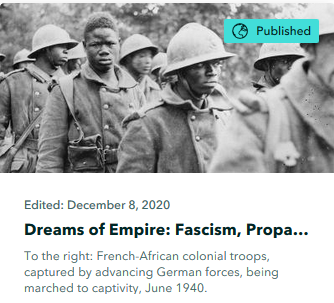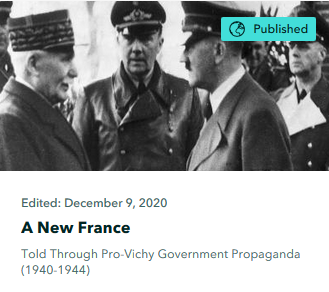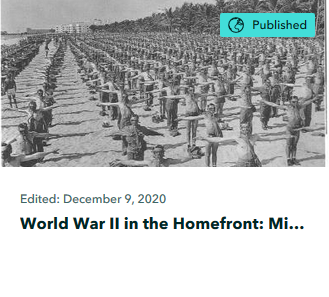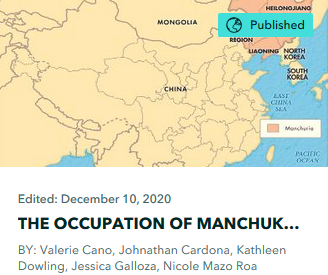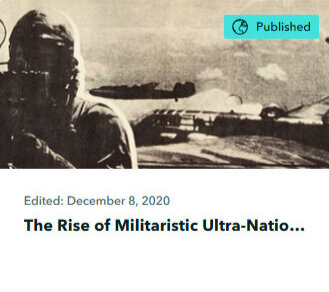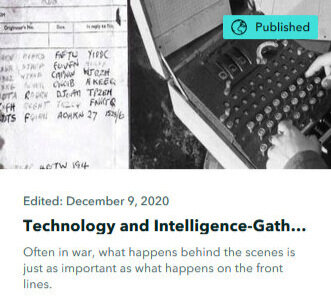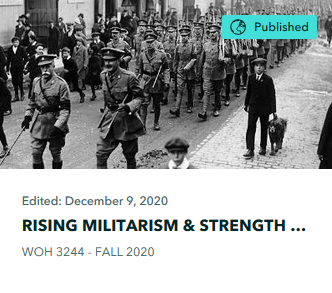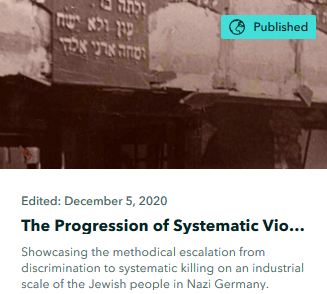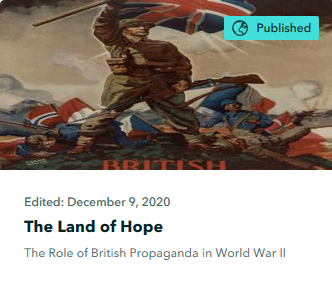Student-designed archival displays from World War Two: A Global History, using archival materials from the Wolfsonian-FIU Library on Miami Beach.
Undergraduate courses
‘Western Civilization’: Europe in the Modern Era
For good and ill, Europe played a key role in shaping the modern world. Why did Europe give birth to human rights and modern democracy, but also dictatorship and genocide? How did Europe come to dominate the global south in the nineteenth century, and lose that dominance in the twentieth? What made Europe the source of both intense nationalism and the universalist ideologies that shaped our contemporary world? In this course, we explore these paradoxes and others as we trace the social, political, and cultural history of Europe from the French Revolution of 1789 into our contemporary era.
Syllabus
The History of Islam and Muslims in Europe
In the face of Islamist terrorism, polemicized debates about ‘burkinis,’ and the challenges of global migration, the notion of a “clash of civilizations” between Islam and the West has gained traction. But the histories of Europe and the ‘Muslim world’ in the past two centuries and beyond are difficult – if not impossible – to disentangle. Beginning with Napoleon Bonaparte’s invasion of Egypt at the turn of the nineteenth century and continuing through the rise of ISIS and the current migration crisis, this course examines the interactions and exchanges of Muslims and Europeans—categories that are not necessarily exclusionary—across the Mediterranean.
Syllabus
War and society in the 20th Century
War is a social activity. War shapes societies – what they value, how they see themselves, and how they interact with other societies. But societies also shape war: ideas about masculinity, gender, race, and class all inform military culture and practice on and off the battlefield. Conflict has indelibly marked societies across the globe. Studying war and its impact can provide new insights into the history of the 20th century. Alongside these topical histories of war, we will also study the ethics, methods, and practices of oral history in order to plan and collect oral histories of war with local veterans and other Miami community members who have experienced armed conflict.
Syllabus F19
SYLLABUS F22
World War TWO: A Global History
The Second World War was a cataclysm of global proportions that transformed the world. It unleashed untold violence, destroyed entire societies, and ended millions of lives – many through systematic extermination. In the process, it profoundly transformed ideas about political rights, gender roles, and national belonging. For better or worse, the Second World War laid the foundations for our contemporary world. This course examines the origins, experiences, and legacies of the Second World War. We will examine the war as a global phenomenon: one that crossed national boundaries and whose effects reverberated around the world. We will also examine the war as a site of memory and an enduring point of cultural reference today.
Syllabus F20
Syllabus SP24
Senior Seminar on War and Gender
This course represents the culmination of the History Major at FIU, where students produce a substantive piece of original scholarship in the form of a senior thesis. Students formulate a research question, survey the secondary literature, locate primary sources, and construct their own argument that draws on this research. While students each develop their own individual research projects, their work will touch in some way on the history of war and gender. Approaching the history of war through the lens of gender opens really interesting theoretical and methodological questions. Through readings and discussions, this course helps students build build a methodological tool kit they can use to approach their research project.
Syllabus
Senior Seminar on The END of EMPIRES
This course represents the culmination of the History Major at FIU, where students produce a substantive piece of original scholarship in the form of a senior thesis. Students formulate a research question, survey the secondary literature, locate primary sources, and construct their own argument that draws on this research. While students each develop their own individual research projects, their work will touch in some way on on the history of decolonization or its consequences. Decolonization represented not just the end of European Empires or the birth of new independent nations, but also a radical restructuring of global politics—one that continues to reverberate today. Through our readings and discussions, we will not only work address some of these questions, but to build a methodological tool kit you can use to approach your own research project.
Syllabus
Graduate Courses
Decolonization and the Global Cold War
The end of empires and the global struggle between East and West dominated the middle of the Twentieth Century, but the relationship between these two historical processes – and indeed, the boundaries of each – are still highly contested by scholars. This course aims to introduce graduate students to the recent literatures of Decolonization and the Cold War. We examine a variety of topics ranging from the global structural shifts implicated in decolonization to new postwar internationalisms to the Cold War’s manifestations outside of Europe. In the process, we interrogate how the “transnational turn” has pushed the analytic limits of the categories of ‘Cold War’ and ‘Decolonization’ and reshaped how historians understand the interplay between local and global politics in the second half of the twentieth century.
Syllabus
Nationalism and Pluralism in Modern Europe
What makes a ‘nation?’ How do individuals become ‘national?’ Why did an exclusionary model of nationhood emerge in a region where ethnic, linguistic, and religious pluralism was the norm, rather than the exception? Finally, how did the nation-state come to constitute the basic building-block of our current international system? This course aims to introduce graduate students to the historiography of nationalism and nationalist politics in Europe across the 19th and 20th centuries. Proceeding thematically as well as chronologically, we examine how classic works and more recent scholarship have attempted to answer some of these questions. In the process, we compare different theoretical and methodological approaches to the study of nationalism, and explore the complex historical interplay between nationalist, local, and internationalist politics.
Syllabus
Race and Migration in Modern Europe
Popular wisdom holds that Europe today faces a migration ‘crisis’ that poses unprecedented challenges to European identity and security. In reality, however, the history of modern Europe has often been a history of human movement, and these movements have played a central role in defining what it means to be ‘European.’ This course introduces graduate students to the intersecting historiographies of migration and race in modern Europe. We explore the patterns of human movement within and connected to Europe, and their relationship to changing definitions of belonging. In the process, we compare different theoretical and methodological approaches, and touch on diverse topics such as empire, surveillance, sexuality, and religion. What forces drove the movement of humans in Europe over the past century and a half? How has migration shaped European culture and society? And why has migration helped to structure ideas about race and ‘European’ identity?
Syllabus F18
Syllabus F22
The Making of the Global Police State
In the summer of 2020, protests against police violence reverberated across the United States and the world. Why did the practices of police violence at issue in these protests look so similar? What are the historical roots of the modern ‘police state,’ and why is policing so entangled with issues of race? What transnational connections might we trace? This graduate seminar takes a comparative approach to understanding the evolution of policing in the 20th Century, crossing between Latin America, the United States, Europe, and western empires.
Syllabus
War, Sex, and Gender
Why are debates over the gender norms of militaries so contentious? Why do sex and the body so often become weapons or targets of war? This graduate seminar aims to introduce students to the theories and methodologies of gender history and to interrogate how gender might serve as a useful analytic lens for understanding warfare, geopolitics, or violent revolution. Through topics ranging from the Great War to Cold War counterinsurgencies, we will ask why sex and gender norms become such potent terrains for contesting power during periods of armed struggle. We will also extend our conversations into the realm of memory, to understand why gendered experiences of conflict remain sites of public debate.
Syllabus
Research Seminar in World History / Atlantic civ II
This course comprises the second half of a two-semester research seminar. This semester, students build upon the preparatory work they carried out last semester to research and write a primary source driven paper of approximately 8,000 to 9,000 words. At the end of the semester, they present your work for colleagues in the department as part of a mini conference. In the first semester of this two-part seminar, we examined theoretical and methodological approaches to using gender as a category of historical analysis in the study of war, we identified how gendered imagery and norms structured popular memory and public debates, and we assessed how war and conflict have transformed sexual and gender norms over the course of the past century.
Syllabus Sp22
SYLLABUS SP23
Histories of Global Illiberalism
Over the past several decades, historians and political scientists have written extensively on the origins and evolution of our current liberal world order. Histories of illiberalism, however, often remain national in scope, constricted in their analysis to the level of individual countries or regions. Why, then, has the so-called ‘liberal’ global order witnessed a constant stream of illiberal movements? What can exploring these movements through a transnational lens reveal about the connections between race, geopolitics, fascism, and the liberal international order? This seminar will explore the global connections between a range of illiberalisms since the early twentieth century: authoritarianism, fascism, colonialism, and the global ‘far right.’ Co-taught with Dr. Alexander Barder in International Relations.
syllabus
Student Projects
Oral Histories
To help us understand and evaluate how wars are experienced, narrated, and remembered, my War and Society in the 20th Century course conducts oral histories. As part of a semester-long project, students learn the basic ethical, methodological, and technical skills necessary for oral history fieldwork. In spring semester 2019, student groups recorded eleven separate oral histories on topics ranging from the treatment of detainees at Bagram air base to the experience of the Mariel Boatlift. The global pandemic has unfortunately delayed efforts to deposit and upload these interviews, but we hope to make them available soon.
In the meantime, if you’re an educator and you’d like to see how I structured the Oral History Lab, check out the materials uploaded here.
ArcGIS StoryMaps
In fall semester 2020, students in my World War Two: A Global History course designed StoryMaps using ESRI’s ArcGIS StoryMaps software. The project aimed to help us think about how public history differs from academic history, and how we can put insights from our class into a format designed to speak to the broader public. Students located primary sources in online archival collections, developed a narrative, and designed their StoryMaps — all while mastering ESRI’s software for the first time. Check out the fantastic results of their research below.
If you are a teacher and you’d like to see how I structured the StoryMaps project, I have uploaded the instructions here.

